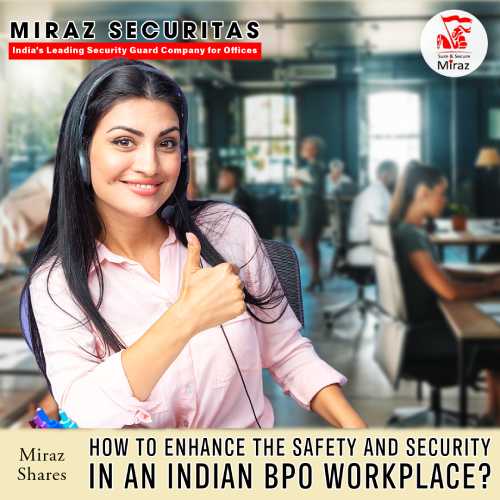In the bustling world of Business Process Outsourcing (BPO), where data flows incessantly and operations never cease, ensuring the safety and security of both employees and sensitive information is important. BPO firms deal with vast volumes of sensitive data, ranging from financial records to personal information and proprietary business insights. However, they have often been dubbed as potential hotspots for data breaches due to lax data security regulations and passive third-party access controls. Consequently, strengthening security measures in Indian BPO workplaces is not just about safeguarding data but also about prioritizing the well-being of employees, who are the backbone of these organizations.
Miraz Securitas, the leading security service provider for offices and BPOs in Delhi, Gurgaon, and NOIDA shares a few ways by which the security and safety of the Indian BPO workplace can be improved.
Compliance Matters
In the BPO industry, where companies handle important customer data and business processes, following rules about privacy, security, and ethics is very important. Compliance with industry regulations is not only a legal obligation but also a vital commitment to building trust with clients and safeguarding the integrity of services provided. With the responsibility of handling sensitive customer information, financial data, and proprietary business processes, adherence to regulations ensures the protection of this valuable data.
Failure to comply can result in severe consequences such as financial penalties, loss of reputation, and legal action. BPO service providers must adhere to intellectual property laws, regulations governing electronic transactions and digital signatures, as well as cybersecurity laws to safeguard against cyber threats. Staying updated with evolving regulations is essential to ensure legal operations and mitigate risks associated with non-compliance.
Strict Rules for Employees
In the BPO industry, ensuring the security of client data is crucial. To prevent any leaks, strict workplace rules are enforced. Employees are not allowed to bring personal IT equipment like laptops or flash drives, which could be used to store sensitive information. Once data serves its purpose, it’s promptly shredded. Additionally, all employees must sign non-disclosure agreements, prohibiting them from sharing any client information. Breaking this agreement could lead to legal consequences. These measures safeguard both client data and employees, ensuring trust and reliability in BPO services.
Implement Physical Security and Access Control Measures
It is of utmost importance to ensure all physical security and access controls are in place at BPO workplaces. Implementing on-premise surveillance technology and access-based role controls restrict unauthorized access to data, allowing only certified and licensed personnel to handle it. Access to sensitive areas within the workplace should be restricted through the use of access cards, biometric authentication, and CCTV surveillance. Visitors should be closely monitored, and visitor access should be limited to authorized areas only.
These measures not only prevent data breaches but also deter cyber attacks and ensure efficient background checks of employees, safeguarding against intentional or unintentional network and data access by unauthorized devices.
Employee Training and Awareness Programs
Training programs and employee awareness initiatives are vital in the BPO industry to strengthen security measures and ensure staff readiness in responding to potential threats effectively. Regular sessions covering security protocols, emergency procedures, and the use of protective equipment instill a culture of preparedness.
Enhanced knowledge on data security, handling sensitive information, and recognizing threats equips employees to safeguard against cyber risks, ensuring a resilient first line of defense.
Crisis Management Plan
A comprehensive crisis management plan is vital for BPO workplaces to ensure safety during emergencies like natural disasters or accidents. It outlines evacuation procedures, assigns responsible personnel, and provides emergency contact information, promoting preparedness and safeguarding employees’ well-being, ultimately maintaining operational continuity and mitigating risks effectively.
Now that Miraz Securitas has outlined these crucial steps for enhancing security and safety in Indian BPO workplaces, it’s evident that a comprehensive approach combining compliance, employee vigilance, physical security measures, training, and crisis management is imperative for safeguarding sensitive data and ensuring operational resilience.
- Home Security Tips If You Are a Single Mom - July 26, 2024
- What Can Security Do To Protect A Mine Site? - July 17, 2024
- What a Security Guard can do for an Oil and Gas Plant Unit? - July 12, 2024

